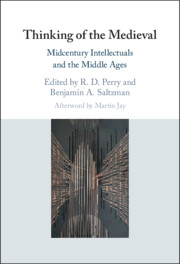Book contents
- Thinking of the Medieval
- Thinking of the Medieval
- Copyright page
- Dedication
- Contents
- Contributors
- Acknowledgments
- About the Cover
- Introduction
- Part I Politics
- Chapter 1 Outside History
- Chapter 2 “The Noblest Blood God Ever Made”
- Chapter 3 Ernst Kantorowicz, Carl Schmitt, and the University of California Regents
- Chapter 4 Hannah Arendt’s Middle Ages for the Left
- Part II Arts
- Part III Epochs
- Bibliography
- Index
Chapter 2 - “The Noblest Blood God Ever Made”
W. E. B. Du Bois’s Medievalism in the Contexts of the World Wars
from Part I - Politics
Published online by Cambridge University Press: 07 October 2022
- Thinking of the Medieval
- Thinking of the Medieval
- Copyright page
- Dedication
- Contents
- Contributors
- Acknowledgments
- About the Cover
- Introduction
- Part I Politics
- Chapter 1 Outside History
- Chapter 2 “The Noblest Blood God Ever Made”
- Chapter 3 Ernst Kantorowicz, Carl Schmitt, and the University of California Regents
- Chapter 4 Hannah Arendt’s Middle Ages for the Left
- Part II Arts
- Part III Epochs
- Bibliography
- Index
Summary
This essay introduces the medievalism of African American sociologist and activist W.E.B. Du Bois. Du Bois’s medievalism, a device to promote the ends of racial justices, also becomes a critical and epistemic tool, a lens through which to view and analyze the present by using the European Middle Ages for comparison and as a metaphor. Examining fictional, sociological, and historical writings, the essay traces Du Bois’s deployments of the Middle Ages from the first decade of the twentieth century to just after the second World War. It considers Du Bois’s early short story “The Princess Steel”; Du Bois’s interwar medievalism through his 1928 novel Dark Princess; and finally his 1947 speech “Color and Democracy” after his book of the same name. The essay establishes that Du Bois employed a sophisticated medievalism strategically in order to assert African Americans’ equal access to and ownership of US and European history and culture.
Keywords
- Type
- Chapter
- Information
- Thinking of the MedievalMidcentury Intellectuals and the Middle Ages, pp. 68 - 87Publisher: Cambridge University PressPrint publication year: 2022

